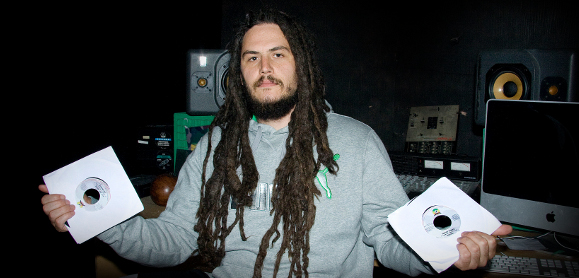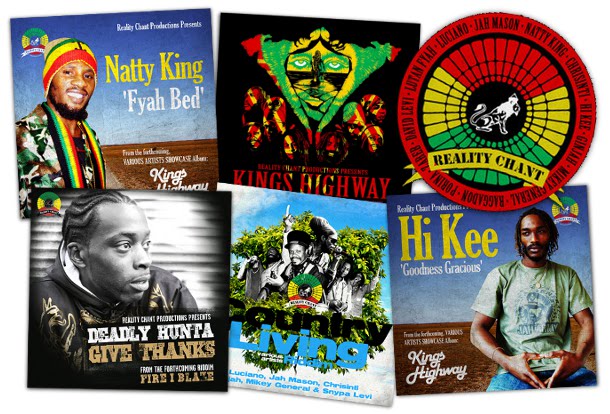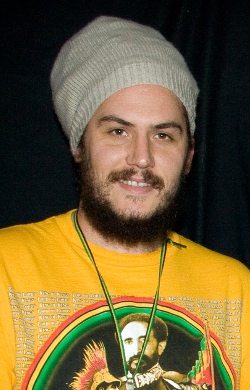Articles about reggae music, reviews, interviews, reports and more...
Interview: Gabriel Calcott from Reality Chant
- Home
- Articles
- Interviews
- Interview: Gabriel Calcott from Reality Chant

Interview: Gabriel Calcott from Reality Chant
"When I started Rastafari was just a part of reggae. Now Rastafari is first"
Sampler
Gabriel Calcott is a producer from Christchurch, New Zealand, where he runs Reality Chant productions, whose rhythms are fast making a name for themselves all around the world. Since the day he was born he was exposed to reggae music from his parents’ record store, working there from age sixteen. Realizing the life of a record store worker involves the daily pain of seeing choice platters pass into the hands of your customers, the young Gabriel shrewdly took advantage of the lack of demand for rare vintage reggae in Christchurch and much of the second-hand stock went straight in to his own crate! Around the same time he became a selector and, in 2000, started his own Dubwize sound system and production house with friend and musical collaborator Confucius. Their first album 'Dubwize Meets Confucius At The Control Tower' was released in 2002 and featured vocals from one Papa Levi (not Phillip Papa Levi the Saxon mc) and a Maori chanter named LittleJah. Their next long-player was 2003’s locally massive 'Dubwise Reality Chant', which boasted international voice talent in the form of London-based Montserrat-born Raggadon and the Nigerian Iya Far’I – both of whom encouraged Calcott in his growing Rastafarian faith. Gabriel then started his Reality Chant label in 2007, which has issued an album by Papa Levi – retitled Sniper Levi – as well as big rhythms such as Country Living, Nah Bow Down and Fire I Blaze (the latter two being relicks of old Dubwize backings) ridden by Luciano, Natty King, Hi Kee, Deadly Hunta and many more. Just as our interview began a minor tremor shook the studio, warning of the tragic earthquake that would devastate Christchurch exactly one month later. Fortunately, Gabriel was out of the country at the time, but our thoughts are with all those who have suffered since then.

Your studio is outside of the city of Christchurch, right near the beach. How does your environment inform your music, and what is a typical day?
I can’t stand city life. I have to be semi out of Babylon to function. I look out of my window and see the hills and it’s important for my creative process to be in an irie space. I do music full time so every day I’m in the studio. Reality Chant is still me and Confucius – between the two of us we can build a whole rhythm. I’m a Nyabinghi drummer so in all my rhythms you’ll hear the heartbeat. I’ll lay down the drums then I’ll take it to his studio round the corner where he’s got a wicked Midi setup and we lay down guitars, bass, keyboards. He plays melodica and flute and all types of things. Then I’ll take it back to mine and do any overdubs, bring in a trumpet player and do the mixing and post production. We’ve got a really tight system and can put down a rhythm in about 3 hours.
 I can’t stand city life. I have to be semi out of Babylon to function
I can’t stand city life. I have to be semi out of Babylon to function
How influenced is your music by Rastafari?
To me it’s all about Rastafari. Getting into reggae music was the foundation of Rastafari. But as I’ve grown with reggae music I’ve also grown in the faith and livity. My last album Kings Highway was livicated to The King and spreading the positive message of Rastafari and everything that comes with it. Reggae for me is a vehicle to work with conscious artists who have a strong voice and something to say. It’s a medium for me to express my feelings, do Jah Works, spread Jah Love, teach the people. When I began Rastafari was a part of reggae music, now reggae music is just a small part of Rastafari. I try to live Ital, read my bible every day, hail The King.
How did you go from producing local artists to international superstars?
It started with the Country Living rhythm. From about 2007 it became my mission to push reggae from New Zealand to the rest of the world because it’s such a limited market here. When we released our first two Dubwize albums in 2002-3 reggae was booming in NZ but by the time we put out Sniper Levi’s album reggae wasn’t so cool anymore with the youth. The music industry was suffering generally in New Zealand and it was time to start looking more globally. The first artist from Jamaica I voiced was Chrisinti whose album Comfort My People I really loved. I messaged him through Myspace and sent him the rhythm and within two days he’d phoned back and left a message saying he’d written two songs, one of which he sang down the phone! I was new to the business then and didn’t know how to negotiate so I think he was pretty happy with the deal! He recorded the tune called So High which set the foundation for the rhythm and working with future artists.
So who was your next link?
A couple of months later Jah Mason was touring with a guy from Australia’s Firehouse sound system who I had brought over to New Zealand for a show. Jah Mason and his manager wanted to record with some local producers from Australia or New Zealand so Lucius from Firehouse put me in touch with them. I sent them the rhythm and the Chrisinti tune and they were really interested so Jah Mason wrote the tune while he was in Australia, flew over for a gig and met me at the studio to voice Put Jah Above on Country Living and a combination for Sniper Levi’s album. When Jah Mason’s manager got back to Jamaica he emailed me links with more artists and I voiced Ginjah who I was really feeling at the time from his song Unification with the German crew Scrucialists. He voiced a nice lovers tune called Happy Years.
How did you link with Luciano?
Just after the Ginjah tune Luciano and Mikey General came out to New Zealand to do some shows and Dubwise were the support act. I picked them up and gave my bro who was driving the Country Living cd for the stereo. As we pulled up to the lights I could see Luciano and Mikey bopping to the music and looking at me with this puzzled look! That night they wrote a song for the rhythm and before the show the next day we went to the studio and voiced the tunes. By luck my Dubwise backing vocalists had just flown into Christchurch that day so Luciano was able to direct the backing vocals for his own song. After that I had enough tunes to put out the rhythm so I contacted One Love in Jamaica and negotiated to get the vinyl pressed and distributed and the rhythm was also released online via Soundquake in Germany in 2008.

How did you come up with your Kings Highway album released in 2010?
Well the Country Living was really more aimed at a dj market with the 45s and it wasn’t so much for home listening so I thought I needed to put those tracks on an album. I didn’t want to do a one rhythm album because that concept wouldn’t really work here in New Zealand so I decided to work on a multi-rhythm album. I linked with some more artists like Lutan Fyah, Natty King and Hi Kee and told them beforehand the concept of the album was The Kings Highway. Natty King and Sniper Levi – who had by this time changed his name again to David Levi which is how he started – did a combination for the title track. They wrote their parts separately but somehow as Rastamen the spirit brought them together to do a song that worked – I hardly had to edit it at all. I told the rest of the artists I didn’t want slackness or even lovers tunes – just pure heartical Rasta business.
 I told the artists I didn’t want slackness or even lovers tunes – just pure heartical Rasta business
I told the artists I didn’t want slackness or even lovers tunes – just pure heartical Rasta business
You’ve also been doing some work with Austria’s House Of Riddim. How did that happen?
That was through Lenny Roots, Jah Mason’s now ex-manager. When I voiced the first tune with Natty King on Kings Highway, Fyah Bed, Lenny and House Of Riddim were co-producing Natty King’s album [Born To Be Free] and he said they’d really like to use the song for the album. They wanted to slightly re-record some of my rhythm – keep it the same but use some of their live band – so I sent him all the files and he recorded live drums, bass and keys and mixed it in.
That album is popular in the Caribbean so even in a slightly different form that must have been great.
Yeah it was. Especially reading reviews that said Fyah Bed was the highlight tune! I’ve also remixed one of their Natty King tunes with Louie Culture which is coming out on his new album. Since Ganga Lee I’ve always had a huge amount of respect for Louie Culture. Since Lenny stopped working with Jah Mason he’s been producing Louie and I’ve produced about five tunes for the album – one of them is called Judgement Fi Babylon on the Fire I Blaze rhythm. I reckon it’s one of the biggest tunes both me and Louie Culture have ever recorded.
We’ve talked about artists from New Zealand, Jamaica and continental Europe. How did you link with Deadly Hunta from the UK for your huge tune Give Thanks on the Fire I Blaze rhythm – and when is the album coming out?
One of Hunta’s main producers DJ Skitz has been coming out to New Zealand for the last ten years. I helped co-promote his gig with Rodney P in about 2008 with Nice Up crew from Wellington. I played Skitz the Country Living rhythm in the car and he said he had a brethren in London – one of the wickedest vocalists I was ever going to hear! – who he had to link me with. He introduced us via email and Hunta voiced the Fire I Blaze rhythm in early 2009 – so it was a little while later that I actually released it! Initially we were going to do an EP but reasoning with him last year we decided to put our tunes together with others he’s done in the UK and Europe for Damalistik Roots Survival and Reality Shock and do an album between Reality Chant and Hunta’s own Much Love label. But he’s still working on getting his album out with Catch 22 which he’s been pushing in all his live shows so that has to come out first.
 In New Zealand Rastafari is majorly misrepresented, especially in the media
In New Zealand Rastafari is majorly misrepresented, especially in the media
New Zealand used to have a Rastafarian MP in Nandor Tanczos which hit the international headlines. How supportive an environment is New Zealand for Rastafari?
Brother Nandor’s been working to establish a United Rastafari Aotearoa National Council. I was up in the North Island with him at a gathering the weekend before last with a big group of Rastas. The brother Nandor is a really serious brethren and personally I probably wouldn’t have been as willing to be involved if it weren’t for his work in parliament. He’s such a hardworking, trustworthy, organized and honest bro so when it comes to organizing a united voice for all Rastas in NZ he was the ideal person. In New Zealand Rastafari is majorly misrepresented, especially in the media.  They think Rastas are just pot smoking hippies. There’s a 12 Tribes in Auckland but they’ve had issues in the organization which don’t put Rastas in the best light. There’s a lack of spokespeople for Rastas in New Zealand which is why we’re establishing the council for I and I people as a movement so we’re not misrepresented.
They think Rastas are just pot smoking hippies. There’s a 12 Tribes in Auckland but they’ve had issues in the organization which don’t put Rastas in the best light. There’s a lack of spokespeople for Rastas in New Zealand which is why we’re establishing the council for I and I people as a movement so we’re not misrepresented.
And how does New Zealand tend to view reggae? Certain bands have crossed over internationally but they’re more fusion based.
In New Zealand reggae music is partially responsible for the misrepresentation. There’s a lack of Rasta livity within New Zealand reggae. A lot of bands here are quite happy to flash the red, gold and green flag and the Lion Of Judah but they’re not Rastas so it causes confusion for people here. Reggae bands just use Rasta imagery as a fashion to sell albums which really vexes me. There’s an international perception that everyone in New Zealand loves reggae. But for me a lot of New Zealand reggae is very watered down lightweight business. They don’t really cover militant topics, they’re saying nothing – just words in the wind. It’s something I’ve always struggled with – the lack of the foundation, the lack of Nyabinghi, the lack of the heartbeat. It’s all a bit loose too. Every “chank” you have to put love into it. You have to spank that guitar and Kiwis just haven’t quite got it.
 There’s a lack of Rasta livity within New Zealand reggae
There’s a lack of Rasta livity within New Zealand reggae
Surely commercialization of Rasta ideas is something that happens the world over?
It’s particularly bad here. There’s a lack of West Indian community here. Apart from myself there’s been maybe three or four Rasta reggae groups over the last 20 years. That has been part of mine, Dubwize and Reality Chant’s mission to create a bit more awareness within the music of Rastafari culture and where reggae music came from. Going back to what I said earlier, Brother Nandor starting the council has been a bit step because it’s nothing to do with reggae. For me when I started Rastafari was just a part of reggae. Now Rastafari is first.
Read comments (2)
| Posted by rambo on 06.16.2011 | |
| Big up Messenjah, been followin dubwize from back in the day, now ya takin Reality Chant to the world! Respect from outta christchurch. | |
| Posted by mark on 10.14.2011 | |
| Hail breddren, I heard a tune by Louis culture, JUDGEMENT FI BABYLON, on a UK reggae podcast, O live in Australia... Can you help me buy it ? Cheers. Mark. | |
Comments actually desactivated due to too much spams
Browse by categories
Recommended Articles
Latest articles
Recently addedView all
© 2007-2026 United Reggae. All Rights Reserved. Reproduction in whole or in part is prohibited. Read about copyright
Terms of use | About us | Contact us | Authors | Newsletter | A-Z














